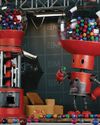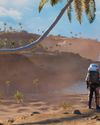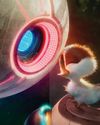يحاول ذهب - حر
Build Your Dream Environment With Unreal Engine 4
March 2021
|3D World UK
Translate your ideas into amazing 3D renders

Developing 3D environments is easier than ever with free software like Unreal Engine and Blender. Often the most difficult part of the process is finding inspiration. Making use of the internet and drawing on real life is a great place to start, but it depends on your goals. If you want to create an environment from your imagination, then coming up with a theme and thoroughly researching it is a good idea. Creating concept art will help you plan before you jump into 3D, or if that’s not your style then being prepared to quickly iterate on your art can also work well. However, if your goal is to further develop your skills for a job one day, then it might be better to put yourself in the shoes of that position and work from there.

For example, this project was developed using pre-existing concept art from another artist (Minjeong Kim), a common workflow in creative studios. This allows you to cut out the leg work and quickly get into 3D. Tackling the process this way helps focus your attention to learn what you want, sharpen your planning skills, and break down a project into easily manageable chunks. This tutorial highlights my method of environment building.

01 BLOCK-OUT THE DESIGN
هذه القصة من طبعة March 2021 من 3D World UK.
اشترك في Magzter GOLD للوصول إلى آلاف القصص المتميزة المنسقة، وأكثر من 9000 مجلة وصحيفة.
هل أنت مشترك بالفعل؟ تسجيل الدخول
المزيد من القصص من 3D World UK

3D World UK
Nvidia GeForce RTX 4080 Super Founders Edition
On the surface, the GeForce RTX 4080 Super is barely any different from the vanilla GeForce RTX 4080 that was launched in 2022.
1 mins
December 2024

3D World UK
MCU VFX moments
Pros choose their favourite CG shots from the Marvel Cinematic Universe
4 mins
December 2024

3D World UK
Nosing around on Fallout
We sniff out the story of how FutureWorks brought The Ghoul to life with the creation of his iconic noseless face
4 mins
December 2024

3D World UK
DISCOVER RED GIANT GEO'S HANDY TOOLS
Heather Sterland introduces one of the newest additions to Maxon's suite of Red Giant VFX plugins with an atmospheric lunar creation
4 mins
December 2024

3D World UK
BUILD AND ANIMATE A FUN-FILLED ROBOT
Expand your horizons with Julio Benavides, who reveals his workflow for creating a charming hard-surface character
4 mins
December 2024

3D World UK
DESIGN STRIKING SCULPTS AT SPEED
Learn how to build 3D characters that balance visual quality and efficient workflow with pro advice from Oh Holy Mary
4 mins
December 2024

3D World UK
CREATE A CANYON ENVIRONMENT
Build a stunning desert setting with an expert walkthrough from Romain Eboli, who uses high-quality Quixel assets
4 mins
December 2024

3D World UK
TURN A 2D CONCEPT INTO AN INCREDIBLE 3D-PRINTED FIGURE
Concept artist Emily Chapman shares her process for sculpting, printing and painting an outstanding model to put on display
8 mins
December 2024

3D World UK
Goodbye SAIGON
Trevor Hogg gets held captive by multiple versions of Robert Downey Jr.while uncovering the visual effects of HBO's spy series The Sympathizer
5 mins
December 2024

3D World UK
IMPRESSIONISTIC REALISM
Trevor Hogg learns how the artisan aesthetic came to be for The Wild Robot
6 mins
December 2024
Translate
Change font size
